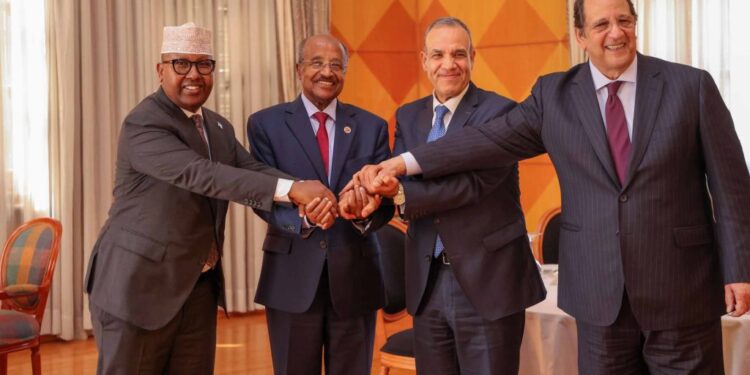MOGADISHU (Somaliguardian) – In a latest TV interview, Egypt’s International Minister Badr Abdelatty asserted that the deployment of Egyptian troops to Somalia is aimed toward aiding the Somali authorities in imposing its authority over its sovereign territory, a declaration that has raised profound issues about Egypt’s underlying motives and the potential ramifications for native political and safety dynamics in a context of escalating tensions.
The remarks adopted Somalia’s latest signing of a tripartite cope with Eritrea and Egypt throughout a gathering in Asmara, the place each Asmara and Cairo affirmed their dedication to respecting Mogadishu’s sovereignty, contrasting with Addis Ababa’s actions in violating it via a naval base settlement with the separatist northern area of Somaliland.
In earlier statements, Egyptian officers asserted that the aim of deploying troops to Somalia was to help the nation in defending itself towards inner threats from militant teams and exterior encroachments on its sovereignty, notably from its neighbor Ethiopia, though they kept away from explicitly naming Ethiopia.
What does Egypt actually intend by asserting its dedication to impose Somalia’s will over its sovereign territory?
“In plain phrases Egypt threatening Somaliland, saying it could impose naval blockade if Hargeisa goes forward and implements MoU with Ethiopia,” says Rashid Abdi, a specialist in Horn of Africa regional political and safety affairs with Sahan Analysis.
He added that this could possibly be a set off level for “new Horn conflict.”
Whereas Egypt perceives Ethiopia’s building of a naval base alongside the Purple Coastline of Somaliland as a safety menace to its very important Suez Canal, notably amid ongoing tensions over the Nile dam undertaking on the Blue Nile River, Cairo is more likely to prolong its efforts to counter Ethiopia’s affect past Somaliland, using all out there means to mitigate it throughout the borders of the Federal Republic of Somalia.
Egypt’s anticipated deployment of troops to Somalia coincides with a interval of serious pressure between the federal authorities and three regional states—Southwest, Puntland, and Jubaland—every of which is resisting federal directives on vital points and pursuing impartial electoral processes with out the consent of Mogadishu.
For practically a decade, Mogadishu has sought to say its authority over federal member states by eradicating incumbent leaders, a problem difficult by the federal authorities’s restricted safety attain throughout the nation; thus, the Egyptian International Minister’s remarks counsel that Cairo is ready to collaborate with Mogadishu to rein in defiant regional leaders, doubtlessly using ways just like these utilized by Ethiopia in assist of former President Mohamed Abdullahi Farmajo towards his adversaries.
If stories of Egypt’s deployment of particular forces in and round Mogadishu are correct, Cairo is predicted to help the federal authorities in exiling opposition leaders from the highly effective Hawiye clan, thereby undermining their means to mount challenges towards incumbent President Hassan Sheikh Mohamud, who has not too long ago implied a method of disarming his opponents via nighttime raids on their residences within the capital.
As opposition leaders accuse President Hassan Sheikh Mohamud of making an attempt to increase his time period, the strategic deployment of Egyptian forces in and round Mogadishu is more likely to help him in countering navy figures resembling Normal Saney Abdulle, who has beforehand mobilized troops to the capital in 2021 and 2017 to demand fast elections; stories additionally counsel that Mohamud is at present making ready lots of of troops in Mogadishu to expel Abdulle’s militias from town’s outskirts, amid issues that Abdulle could align with opposition chief Sharif Sheikh Ahmed, who’s poised to problem the incumbent within the 2026 elections.
Key opposition figures contend that President Hassan Sheikh Mohamud has embraced authoritarian tendencies since his re-election in 2022, regardless of campaigning on a platform of openness, democracy, and the safety of rights; they assert that Eritrea’s authoritarian chief, Isaias Afwerki, has influenced him, instructing him to emulate his decades-long iron-fisted rule with little dissent. Additionally they word that Afwerki equally swayed former President Farmajo, who had promised common suffrage, transparency, and rule of legislation throughout his 2017 marketing campaign. For a lot of observers, Mohamud’s alignment with dictators Afwerki and Egypt’s el-Sisi—evident in a latest tripartite settlement—alerts a troubling trajectory that would result in regrettable erosion of public belief and good governance, doubtlessly paving the best way for political uncertainty and extended bickering all through the nation.
In abstract, urgent questions stay whether or not Egyptian troops will assist Somalia in defending itself towards Ethiopia, interact in combating the resilient Al-Shabaab insurgency—an Al-Qaeda affiliate that has eluded defeat regardless of greater than a decade-long presence of a powerful African Union peacekeeping power with assist from the US, the United Nations, the UK and different western powers —or search to impose the federal authorities’s authority over Somaliland, or assist oust state presidents against the central authorities; consultants warn that overseas troops could wrestle to perform even one among these advanced duties, emphasizing that it’s in the end the Somali forces who should undertake this heavy lifting, a view that diverges from the reassuring narratives of presidency supporters and affiliated media.
Contact us: information@somaliguardian.com










